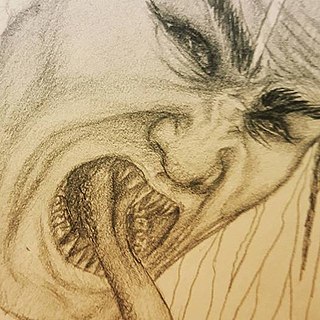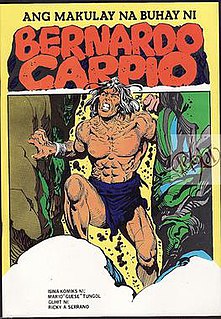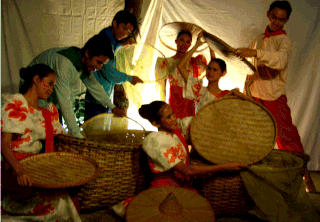
The Manananggal is a vampire-like mythical creature of the Philippines, a malevolent, man-eating and blood-sucking monster or witch.

An Aswang is an umbrella term referring to a shapeshifting evil spirit in Filipino folklore, vampire, a ghoul, a warlock/witch, or different species of werebeast. It is the subject of a wide variety of myths and stories. Spanish colonists noted that the Aswang was the most feared among the mythical creatures of the Philippines, even in the 16th century. The myth of the aswang is well known throughout the Philippines. It is especially popular in the Visayas, southern parts of Luzon, and parts of Mindanao. Other regional names for the aswang include "tik-tik", "wak-wak", "sok-sok" and "kling-kling".
Bienvenido Lumbera is a Filipino poet, critic and dramatist. He is a National Artist of the Philippines and a recipient of the Ramon Magsaysay Award for Journalism, Literature and Creative Communications. He won numerous literary awards, including the National Book Awards from the National Book Foundation, and the Carlos Palanca Memorial Awards.
Fidel Doloreto Rillo Jr. is a Filipino writer and book designer.
Liwayway A. Arceo (1924–1999) was a multi-awarded Tagalog fictionist, journalist, radio scriptwriter and editor from the Philippines.

Cirilo F. Bautista was a Filipino poet, critic and writer of nonfiction. He was conferred with the National Artist of the Philippines award in 2014.
Teo Antonio is a Filipino poet. He was born in Sampaloc, Manila. He was educated at the University of Santo Tomas where he studied Fine Arts. Antonio is the son of Emilio Mar Antonio, hari ng balagtasan during the 1950s.
César Ruiz Aquino is a Filipino poet and fictionist. He was born and raised in Zamboanga, Philippines. He was educated at Silliman University, at UP Diliman, at the Ateneo de Manila on Padre Faura, and at AE. His writing career began when Philippine Graphic published his story 'Noon and Summer' written in 1961. At age 19, he received an invitation to - and a virtual writing fellowship at - the first, 1962, Silliman National Writers Summer Workshop in Dumaguete that included as fellows Wilfrido D. Nolledo, Jose Lansang Jr. and Wilfredo Pascua Sanchez - as well as mentors Nick Joaquin, Franz Arcellana and Edilberto Tiempo and Edith Tiempo.
Merlinda Bobis is a contemporary Philippine-Australian writer and academic.

Bernardo Carpio is a legendary figure in Philippine mythology who is said to be the cause of earthquakes. There are numerous versions of this tale. Some versions say Bernardo Carpio is a giant, as supported by the enormous footsteps he has reputedly left behind in the mountains of Montalban. Others say he was the size of an ordinary man. Accounts of the stories have pre-colonial origins, but the name of the hero was Hispanized during the Spanish colonization. The original name of the hero has been lost in time. All versions of the story agree that Bernardo Carpio had a strength that was similar to that of many strong men-heroes in Asian epics, such as Lam-ang.
The Tiyanak is a vampiric creature in Philippine mythology that takes on the form of a toddler or baby. Although there are various types, it typically takes the form of a newborn baby and cries in the jungle to attract unwary travelers. Once it is picked up by an unfortunate passerby, it reverts to its true form and attacks the victim. The tiyanak is also depicted to take malevolent delight in leading travelers astray, or in abducting children.
Ama-Ron or Amaron is a character in Philippine mythology of whom little is known. His story is more common in the southern parts of Luzon, figuring mostly in folk songs. Like most male Filipino mythological heroes, he is described as an attractive, well-built man who exemplifies great strength. Ama-ron is unique, however, due to his apparent lack of an origin myth.
Doreen Gamboa Fernandez was a noted Filipino teacher, writer, cultural historian, and scholar who wrote extensively about Philippine theater and Filipino cuisine.
Writers' Union of the Philippines is the largest organization of Filipino writers in the Philippines. Established in 1974, the organization was first known by the English version of its name, the Writers' Union of the Philippines. It has the primary goal of promoting Philippine literature, uniting writers in the Philippines, and providing seminars, workshops, and symposia in order to achieve the first two goals. Its National Congress meeting is held annually during the last Saturday of August. The organization officially used the Filipino-language translation of its name, Unyon ng mga Manunulat ng Pilipinas (UMPIL), in 1987.
Efren Reyes Abueg is a well-known and recognized Filipino-language creative writer, editor, author, novelist, short story writer, essayist, fictionist, professor, textbook writer, and anthologist in the Philippines. His works appeared on magazines such as Liwayway, Bulaklak, Tagumpay, Mod, and Homelife.
Rogelio Mangahas was a Filipino artist and poet.
Ernani Joson Cuenco was a Filipino composer, film scorer, musical director and music teacher and Philippine National Artist for Music. He wrote an outstanding and memorable body of works that resonate with the Filipino sense of musicality and which embody an ingenious voice that raises the aesthetic dimensions of contemporary Filipino music. Cuenco played with the Filipino Youth Symphony Orchestra and the Manila Symphony Orchestra from 1960 to 1968, and the Manila Chamber Soloists from 1966 to 1970. He completed a music degree in piano and cello from the University of Santo Tomas where he also taught for decades until his death in 1988.
Elena Rivera Mirano is a Filipino academic in art studies, a music scholar, choir conductor and singer in the Philippines. Rivera was born in 1951.












